Kolimoddi Dafadaar
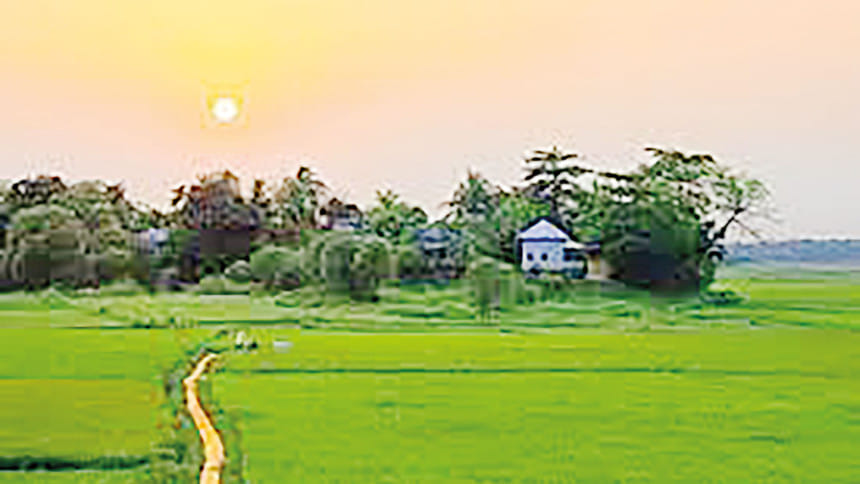
The banks along the river Shitalakshya flooded on a regular basis. During the rainy season, most villages around the area turned into islands. Temporary pathways made with bamboos were quite common. But it would also require special training to cross those narrow footbridges. Two bamboo poles were set side by side on top, and a pair posted at the bottom to hold them up. It was not unusual to find one of the bamboos missing after reaching the middle of the bridge. The moment you step on such a structure, you would find it shaking like a small boat with no boatman. The wooden ones were no better. Since goats and cows also used these footbridges, within a year after their construction, they just fell apart. Standing on weak wooden poles, they rattled like the teeth of old people. Water raged beneath the pathways.
Kolimoddi was a local village guard in this area. When he was in his early 20s, he had started working as a dafadaar with the Union Board. Since then, he had been known as Kolimoddi Dafadaar. Now he was almost sixty with graying hair and beard. In his younger days, he was skilled in the traditional stick fighting. He still kept shoulder-length hair, the way a professional lathial would have it. He was the leader of the guards and the locals called him "dafadaar saab." He led a simple life and was popular among children. Once a week, he presented himself at the police station and was respected by all.
However, Kolimoddi was not well-off. He owned a thatched hut and a kitchen room covered with palm leaves in a small yard. The land in front of the house was used to cultivate Ayurvedic medicines that brought good price in town. A small portion of the land was also used to cultivate paddy, but that only provided food for about two months. He had a wife and three children and he earned a small salary from his job. There were a few mango, jackfruit, guava and betel nut trees that brought in some extra money. His wife also had a cow and a goat along with a few chickens and they somehow managed. Yet, he never borrowed money and was known as a jolly man who always had a smile on his face. He was regularly seen at the tea-stall of the local bazar.
In the beginning of the war in the year 1971, the Khan senas had taken over the police station. The Dhaka-Chittagong highway was close by and the army came to take control over the roads. A school house that stood near the highway was occupied by the military. On some nights, people heard sounds of gunfire. Apparently, the freedom fighters appeared on and off and swiftly disappeared after killing the enemies. The military had made the local people stand in line at the bazar to question about the Mukti bahini, but to no avail.
A few days ago, something terrible had happened. There were some Hindu families that lived on the south-west side of the Bazar. Even though the area was wild and the paths serpentine, the women of the area were very careful about being seen near the river. The Khan senas were not to be trusted.
Yet, on that particular afternoon, two women, a widow and her young daughter on their way back home from the river, had met with five of the patrolling soldiers. The women ran for their lives, but they were thoroughly wet and the five starving beasts chased after them. Finally the men caught up with the poor women who had taken shelter at the primary school house. There was nobody in the school premises except for a rat which also ran off at the sight of the two women and their perpetrators.
The women could be heard screaming for some time, but then they fell silent. When their victims finally lost consciousness, the victors emerged with smug smiles on their faces.
They got on the main road, and suddenly, there were sounds of gunfire. One of the soldiers dropped dead and another was wounded. Leaving a dead comrade behind, the men ran for their lives. Since that day, they started a mission of finding the freedom fighters.
That is how Kolimoddi ended up with them. He was forbidden to go home during the day and was allowed three taka per day for lunch. Did the army turn him into a razzakar? Kolimoddi did not know that. He accompanied the army men with a typical smile. If anyone reproached him, he just replied mildly, "I work for the government."
One Wednesday, Kolimoddi was asked to guide ten soldiers on an expedition. It was a village where most were Hindus. Apparently, many outsiders had come in there and they were all suspected as Indian spies. Around 11 in the morning, they crossed a field and a small village. The sun was shining brightly. A boy with several cows was seen on the field.
"Mukti! Mukti!" One soldier cried.
"Where?"
"On our right."
Kolimoddi tried to say that it was just a boy. But they replied, "Shut up, you son of an infidel!"
They all fired together. The entire area shook and Kolimoddi Dafadaar watched the sixteen-year-old son of his childhood friend Saijoddi Khalifa, crying out for the last time for his mother and fall down.
"One Mukti down! Let's move forward."
"Ji, huzur!" replied Kolimoddi and walked forward.
By this time the people in the vicinity had heard about the expedition. When the army along with Kolimoddi went to the next village, they saw that it stood like an island. The villagers had hidden themselves in the submerged paddy fields in small boats. Those that could not afford boats, had found refuge among the water reeds.
They could not find a single person. The houses were empty as if some epidemic had hit the village. Even the dogs and cats were not to be seen. The men spotted a goat and they agreed to take it with them so that they could have a feast later.
Around 12 noon, the commander ordered, "Halt."
They were near a wooden pathway. It rose on both sides and there were green paddy fields beyond it. They could see the top of village houses on the other side, but to enter the village they would have to cross the bridge.
"Isn't there any other way?" cried one of the men. Kolimoddi shook his head.
The army men were unwilling to climb the half-broken pathway and asked Kolimoddi to go forward. The old man climbed up the steep structure. There was no supporting bamboo on the side. But for the villagers, it was a normal thing. Children climbed over it and jumped into the water often.
Kolimoddi walked on while his feet danced unsteadily on the rotten planks and bamboos. He called out to the soldiers, "Come along, Sirs."
But the men kept on looking at his lower limbs. Kolimoddi pranced forward like an expert actor. He reached the top part of the bridge and looked down where the planks were gone giving a glimpse of the rushing water.
Suddenly, he screamed, "Mukti! Mukti!" A body fell into the water along with pieces of rotten wood.
Guns roared from the other side and before the army could take position, a few of them were already dead. There was no battle. The soldiers were trying to flee the scene.
He was seen again on 16 December by the road side tea-stall among his friends all of whom were freedom fighters. He still wore his old uniform and people identified him as Kolimoddi Dafadaar. (abridged)
Abu Jafar Shamsuddin was the recipient of Bangla Academy Literary Award in 1968 and Ekushey Padak in 1983.
Sohana Manzoor teaches English at ULAB.

 For all latest news, follow The Daily Star's Google News channel.
For all latest news, follow The Daily Star's Google News channel. 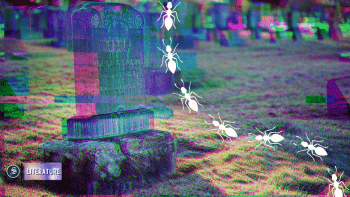

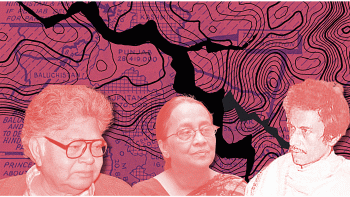




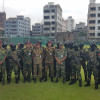




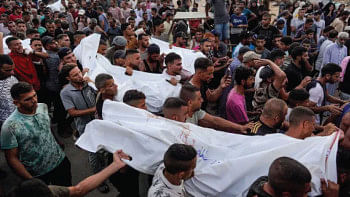
Comments